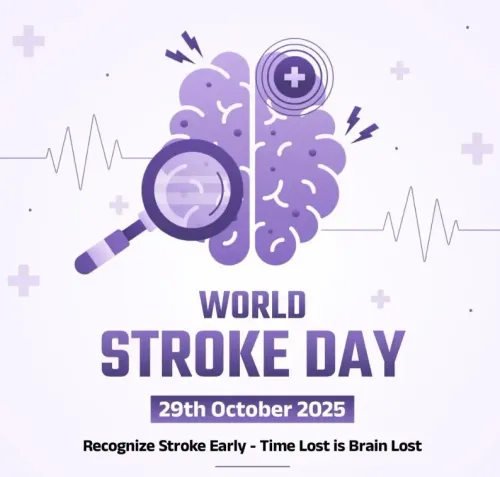Can Eye Scans Reveal Insights into Aging and Heart Disease Risk?

Synopsis
Key Takeaways
- Eye scans may help predict heart disease risk.
- Retinal imaging is a noninvasive way to assess vascular health.
- The study involved over 74,000 participants.
- Identified proteins may serve as drug targets for aging-related conditions.
- Further research is needed to validate these findings.
New Delhi, Oct 25 (NationPress) Researchers from Canada have discovered that examining the tiny blood vessels in the eyes might provide valuable predictions regarding an individual’s likelihood of developing heart disease and their biological age. The study, featured in the journal Science Advances, indicates that retinal imaging could eventually function as a noninvasive method to assess overall vascular health and biological aging, paving the way for early detection and intervention.
“By linking retinal imaging with genetics and blood biomarkers, we have revealed molecular pathways that clarify how aging impacts the vascular system,” stated Marie Pigeyre, an Associate Professor at McMaster University’s Department of Medicine in Canada.
The eye offers a distinctive, noninvasive perspective into the body's circulatory system. Alterations in the retinal blood vessels typically reflect changes occurring in the body's smaller vessels,” Pigeyre added.
In this study, the team integrated retinal examinations, genetic information, and blood sample evaluations from over 74,000 participants.
Individuals exhibiting simpler, less branched blood vessels were determined to be at a greater risk of cardiovascular ailments and exhibited signs of biological aging, including heightened inflammation and reduced lifespan.
Currently, diagnosing age-related conditions such as heart disease, stroke, and dementia necessitates multiple tests. The aspiration is that retinal scans alone may ultimately serve as a rapid and accessible method to evaluate aging and cardiovascular risk; however, further research is essential.
The team also analyzed blood biomarkers and genetic data, identifying possible biological reasons behind the alterations in the eye’s blood vessels. This analysis led to the identification of specific proteins, namely MMP12 and IgG-Fc receptor IIb, that may contribute to aging and disease.
Both proteins are associated with inflammation and vascular aging. According to Pigeyre, these proteins might emerge as potential targets for future pharmacological interventions.
“Our discoveries highlight possible drug targets for mitigating vascular aging, alleviating the burden of cardiovascular diseases, and ultimately enhancing lifespan,” she concluded.









